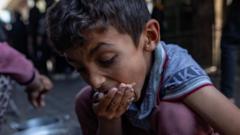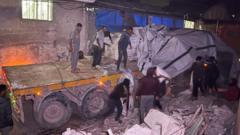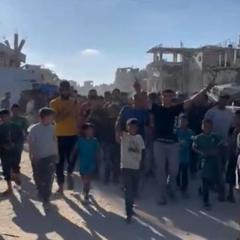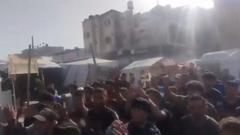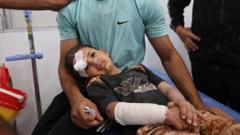The bombing of the family home of Dr. Alaa al-Najjar in Khan Younis has resulted in the death of nine of her ten children. Amid increasing casualties in the ongoing conflict, calls for international intervention and aid to Gaza grow louder.
Tragedy Strikes as Israeli Airstrike Claims Lives of Doctor's Children in Gaza
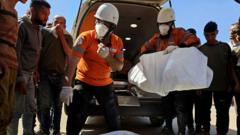
Tragedy Strikes as Israeli Airstrike Claims Lives of Doctor's Children in Gaza
An Israeli airstrike has left a doctor mourning the loss of nine of her children, raising devastating questions about the humanitarian crisis unfolding in Gaza.
An Israeli air strike on Gaza has tragically struck the home of Dr. Alaa al-Najjar, leading to the deaths of nine of her ten children, according to reports from Nasser Hospital in Khan Younis. The attack occurred shortly after Dr. al-Najjar's husband, Hamdi, returned home from driving her to work. Though her husband sustained injuries, he survived the devastating incident along with their surviving child, an 11-year-old boy who was operated on by British surgeon Graeme Groom.
A harrowing video, which was shared by the director of the Hamas-run health ministry and verified by the BBC, depicted small, burned bodies being recovered from the ruins of the al-Najjar home following the strike. The death toll in Gaza continues to rise, with more than 70 reported killed in Israeli airstrikes on Friday, and at least six more fatalities reported on Saturday.
Dr. Muneer Alboursh, director of the Gaza health ministry, stated on X that the airstrike hit the residential area just minutes after Hamdi returned home. The loss of young lives sent shockwaves through the community, with Dr. al-Najjar and her family suffering an "unimaginable" tragedy. According to Groom, al-Najjar's husband is not only a doctor but has "no political or military connections," further amplifying the senselessness of the violence.
In a plea for mercy, relative Youssef al-Najjar lamented the ongoing suffering in Gaza, asking the international community and various factions to intervene and alleviate the dire conditions facing civilians. The UN Secretary-General, António Guterres, has described the current phase of the war as "the cruellest," denouncing the Israeli blockade on humanitarian aid instituted in March.
Despite a recent partial lift of the blockade, aid entering Gaza remains inadequate for its 2.1 million inhabitants. A fraction of the required food supplies has led to panic and chaos as residents vie for limited resources, such as bread. A UN-backed assessment conducted earlier this month classified the population as being at "critical risk" of famine, with severe shortages of water compounding the growing humanitarian crisis.
Israel has justified the blockade by stating it is intended to pressure Hamas to release hostages taken during an attack on October 7, 2023, in which roughly 1,200 people died. However, the health ministry in Gaza claims that since the onset of hostilities, at least 53,822 people, including a staggering 16,500 children, have perished in the conflict.
With the situation becoming increasingly dire for Gazans, the fear of further military actions persists, exacerbating the ongoing humanitarian catastrophe.


